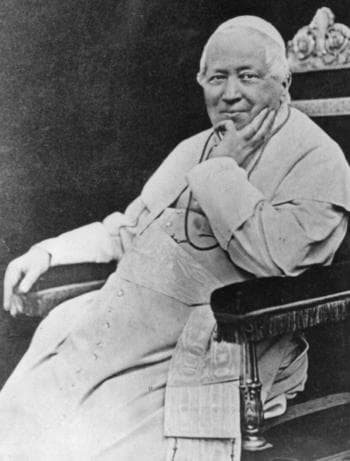Pope Blessed Pius XI
Saint
Feast Day: February 7
Birth: May 13, 1792
Death: February 7, 1878
Biography
Pope Blessed Pius IX, also known as Giovanni Maria Mastai-Ferretti, was born on 13 May 1792 in Senigallia, Italy, to Gerolamo Ferretti and Caterina Solazzi. He was the ninth child in the family and was described as a frail, intelligent, and pious boy. However, he suffered from epilepsy during his early years. Pius IX's education started at the Piarist College in Volterra, Italy, where he studied from 1802 to 1809. Due to political disturbances in Rome, he had to study there from 1809 to 1810 and later returned in 1814. Upon his return, he sought admission to the Papal Noble Guard but was turned down because of his epilepsy. In 1814, Pius IX enrolled at the Roman Seminary, where he studied theology until 1818. It was during this period that his epilepsy disappeared. He was ordained as a priest on 10 April 1819 in Rome. Pius IX then became the spiritual director of the orphan asylum of Tata Giovanni in Rome and later served as the auditor of the apostolic delegation to Chile from 1823 to 1825. Throughout his career, Pius IX held various important positions within the Catholic Church. He served as the canon of San Maria in Via Lata, Rome, and became the director of San Michele hospital in Rome. On 21 May 1827, he was chosen as the archbishop of Spoleto, Italy, and on 1 June 1827, he was named assistant at the Pontifical Throne. Pius IX was later appointed as the archbishop of Imola, Italy, on 17 December 1832, and was created a cardinal on 23 December 1839 by Pope Gregory XVI. Pius IX's election as the 255th pope took place in the conclave of 1846. He was the last pope to hold temporal power, meaning he ruled a secular state. His election raised the hopes of patriotic and liberal circles of Catholics. One of his initial acts as pope was granting amnesty to all political prisoners. During his papacy, Pius IX made significant contributions to Catholic theology. On 8 December 1854, he defined the dogma of the Immaculate Conception of the Blessed Virgin Mary. Another notable event during his reign was the celebration of the First Vatican Council from 1869 to 1870, where the dogma of papal infallibility was defined. However, the council was interrupted by the Franco-Prussian War. Pius IX also supported several reforms within the Papal States, including central Italy and other territories like Assisi. Sadly, the unification of the Kingdom of Italy in 1870 and 1871 led to the loss of these territories. Despite these challenges, Pius IX gained a reputation for being a patriotic and reforming pope, surpassing the length of service of all popes except Saint Peter the Apostle. Pius IX's cause for beatification was one of the longest and most difficult in Church history. It began under Pius X on 11 February 1907 and was later re-launched by Benedict XV and Pius XI. Finally, on 7 December 1954, Pius XII resumed the cause. On 6 July 1985, the Congregation for the Causes of Saints promulgated the decree on the heroic exercise of theological and cardinal virtues, allowing his proclamation as Venerable. Pius IX was known for his unconditional love for the Church, charity, and his high regard for the priesthood and missionaries. The miracle attributed to him was the inexplicable cure of a French nun, which was verified by the Medical Commission on 15 January 1986 and proclaimed definitive in December 1999. Pope John Paul II venerated Pius IX on 6 July 1985, and he was beatified on 3 September 2000 in Saint Peter's Square, Rome, Italy. Pope Blessed Pius IX died on 7 February 1878 in Vatican City of natural causes. He was buried in the basilica of San Lorenzo fuori le mura in Rome, Italy. Pius IX is revered as the patron of the Bavarian Congregation, and his feast day is celebrated on 7 February.
